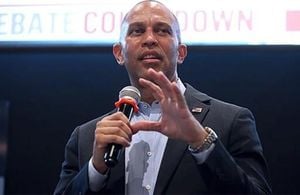In a world economy still reeling from the aftershocks of sweeping US tariffs, the past week has brought both optimism and anxiety to the international trade stage. The International Monetary Fund (IMF) has hailed India as a “key growth engine” for the global economy, even as Switzerland, long considered a paragon of innovation and competitiveness, finds itself struggling under the weight of punitive American tariffs. These developments, unfolding against a backdrop of shifting alliances and economic recalibration, offer a revealing look at how nations are adapting to the new realities of global commerce.
IMF Managing Director Kristalina Georgieva set the tone on October 8, 2025, with remarks that were both cautionary and hopeful. Speaking ahead of the IMF and World Bank annual meetings in Washington, Georgieva underscored that “global growth patterns have been changing over the years, notably with China decelerating steadily while India develops into a key growth engine.” According to the IMF, global growth is expected to slow “only slightly this year and next,” buoyed by stronger-than-expected performance in the United States and emerging economies, especially India.
Georgieva’s comments come as the world economy grapples with the aftereffects of tariffs imposed by US President Donald Trump on April 2, 2025. These tariffs, which included a 50% levy on Indian imports and a staggering 39% on Swiss goods, have sent shockwaves through international markets. Yet, as Georgieva pointed out, “The world has avoided a tit-for-tat slide into trade war -- so far.” She credited improved policy fundamentals, the adaptability of the private sector, and “lower-than-expected tariffs” for helping the global economy withstand acute strains from multiple shocks. Still, she warned, “The full effect of those tariffs is still to unfold. Global resilience has not yet been fully tested.”
For India, the news has been largely positive. The country posted a robust 7.8% real GDP growth in the first quarter of fiscal year 2025–26, outperforming the Reserve Bank of India’s earlier estimate of 6.5%. This surge has been attributed to a revival in domestic consumption and a recent reduction in GST rates, which have helped cushion the impact of external shocks. Indian Finance Minister Nirmala Sitharaman was quick to reassure markets, stating, “The Indian economy is resilient and continues to grow sustainably.” She emphasized that the country’s growth trajectory would not be derailed by external turbulence, reinforcing India’s position as a stabilizing force in the global economy.
Contrast this with the situation in Switzerland, where the outlook is far less rosy. As reported by BBC on October 9, 2025, Switzerland has been hit with a punitive 39% tariff on its exports to the US since August 1, 2025. Despite frantic efforts to renegotiate with Washington, Swiss officials have been unable to persuade the US administration to relent. “Thirty nine percent tariffs: I was just shocked,” said Jan Atteslander, director of international relations for the Swiss business federation Economiesuisse. “This is unjustified, you can't explain why they are so high.”
The US market is critical for Switzerland, accounting for about 17% of its total exports. The tariffs, the highest in Europe and the fourth-highest worldwide, have already led to shrinking economic growth and looming job losses in key industries. While Swiss pharmaceutical exports to the US have so far escaped the 39% tariff, they could soon be hit with a threatened 100% tariff on imported medicines—a prospect that has the industry on edge.
Perhaps nowhere is the impact more keenly felt than in Switzerland’s world-leading medical technology sector. Companies like MPS, based in Biel—the historic heart of Swiss watchmaking and now a hub for precision medical devices—are struggling to adapt. MPS produces a range of medical instruments, from aortic valve replacements to the world’s only medically-registered artificial heart, of which just 120 have been transplanted globally. The integrated nature of Swiss production, where even the machines used in manufacturing are locally made and calibrated, makes relocating assembly to the US nearly impossible. “It would be extremely challenging if not impossible to separate the components from the actual product assembly,” explained MPS CEO Gilles Robert. “And I think those types of skills would be extremely hard to find in the US.”
The consequences for American consumers are significant. According to Adrian Hunn of SwissMedTech, “Medical devices will get more expensive for US patients.” With many US hospitals and healthcare systems funded by public reimbursement programs, the added costs are likely to fall on taxpayers as well. Some Swiss companies have already stopped exporting to the US, citing unsustainable margins and the impossibility of absorbing the 39% tariff. “These are companies that have very good products,” said Atteslander. “And they have told us, we just stopped delivering, sorry guys.”
Despite the adversity, the Swiss are not retaliating. Instead, they are actively seeking new markets. A trade deal with India—“the fastest growing economy on the planet, 1.4 billion potential consumers,” as Atteslander notes—came into force on October 1, 2025. Agreements with the South American trade bloc Mercosur and an upgraded arrangement with China are also in the works, while Switzerland continues to enjoy free trade with the European Union, which accounts for half its exports.
Swiss business leaders, while disappointed with Washington’s approach, remain cautiously optimistic. “To be a successful export nation, you have to have resilience in your DNA,” Atteslander observed. The more lasting damage, however, may be to the traditionally close business ties between Switzerland and the US. “I have a lot of friends there. So, this, it didn’t change my view of America, but it did change my view, you know, of how the current administration in the US is acting globally, and treating allies,” said Hunn. Robert echoed this sentiment: “Even though I’m sad about this situation, we will overcome, we’ll find solutions, and I’m sure in the end reason will prevail.”
As the world’s economic powerhouses recalibrate and adapt, the starkly different fortunes of India and Switzerland offer a window into the evolving dynamics of global trade. While India emerges as a bright spot amid uncertainty, Switzerland’s struggles serve as a cautionary tale about the far-reaching consequences of protectionist policy. For now, all eyes remain on Washington—and on the resilience of those determined to weather the storm.




